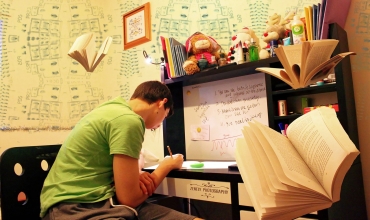Курсова робота
Using of songs and poems at English lessons
Outline
I. Introduction
II. The main part.
1. Research in the history of the question.
2. Research of modern methodologists.
3. What music and poems to use.
4. Why to use music and poems.
III. Practical part.
IV. Handouts.
V. Conclusion.
VI. Literature.
Having got certain amount out by Ukrainian foreign methodologists we
like to present our own elaborations:
For a young learners:
– While working over the theme “Months” a teacher can suggest such kind
of activity: in the poem, given below the names of some month are
ommited the pupils task is to guess what should be filled in stead of
gaps:
Cuckoo
Cuckoo, cuckoo,
What do you do?
In… (April)
I open my bill,
In… (May)
I sing night and day;
In… (June)
I change my tune;
In… (July)
Away I fly;
In… (August)
Go I must.
For the next activity coloured chalk is necessary. On the blackboard a
girl is drawn. Children give her name. And then with a help the poem and
they they change coloured chalk it into a coloured and bright girl.
She wears a red hat.
She wears a white shirt
and a red school tie
She wears a grey school blazer with
The school badge on it
When it’s very cold she wears red
Gloves and a red scarf.
For the kind of activity given below pupils will need colour pencils and
a piece of papers. Teacher gives them a classical piece of music, or
some other kind of music, but without lyrics. White listening to the
music pupils have to draw what this music force them to imagine. It may
be sea, sky, bird and so on. After that they have to explain what they
drew and why.
As small children like to sing songs, songs for children in particular.
We’d like to suggest these songs to sing during English lessons.
The first two are nursery rhymes.
JACK AND JILL
Jack and Jill Then up Jack got,
Went up the hill, And home did trot,
To fetch a pail of water; As fast as he could caper;
Jack fell down, He went to bed,
And broke his crown, To mend his head,
And Jill came tumbling after. With vinegar and brown paper.
crown — head; caper — to run and jump; tumble — to fall suddenly.
LITTLE BOY BLUE
Little Boy Blue,
Come blow your horn,
The sheep’s in the meadow,
The cow’s in the corn.
Where is the boy
Who looks after the sheep?
He’s under a haycock
Fast asleep.
Will you wake him?
No, not I,
For if I do,
He’s sure to cry.
Next song should be used in senior classes:
BILLY BOY
Oh, where have you been, Billy Boy, Billy Boy,
Oh, where have you been, charming Billy?
I have been to seek a wife, she’s the joy of my life,
She’s a young thing and cannot leave her mother.
Did she ask you to come in, Billy Boy,
Billy Boy, Did she ask you to come in, charming
Billy? Yes, she asked me to come in, there’s a dimple in her chin,
She’s a young thing and cannot leave her mother.
Can she bake a cherry pie, Billy Boy, Billy Boy,
Can she bake a cherry pie, charming Billy?
She can bake a cherry pie, quick as you can wink an eye,
She a young thing and cannot leave her mother.
Can she make a feather bed, Billy Boy, Billy Boy,
Can she make a feather bed, charming Billy?
She can make a feather bed, while a-standing on her head,
She’s a young thing and cannot leave her mother.
How tall is she, Billy Boy, Billy Boy,
How tall is she, charming Billy?
She is tall as any pine, and as straight as a pumpkin vine,
She’s a young thing and cannot leave her mother.
How old is she, Billy Boy, Billy Boy,
The song “You are my sunshine” can be used when St.Valentine’s Day is
celebrated:
YOU ARE MY SUNSHINE
This song can be used in senior classes. If someone in the class can
play the guitar it’ll be perfect to sing it to the guitar.
Before giving any song teacher must give unknown words to children. The
post-listening task is to discuss the message of the song.
The next poem “Winter” can be used, of course, in winter. Teacher’s
task is to make hand-made snow-flakes and to choose one pupil who will
be misses winter. Everyone must learn the poem by heart to for the
lesson then they close their eyes and recite the poem all together.
During this time “misses Winter” walks between the desks and give
everybody a paper snow-flake – a present from her.
WINTER
This magic all around me
Is slowly waltzing here
And everything that I can see.
Is white and light, and fair…
I ask myself so often why
Is Winter doing so
And in the end she says good bye
And makes the beauty gone.
For advanced learners:
This task a teacher can use in 10-th or 11-th grades. Pupils must find
and translate into English information about the group from Finland “The
Rasmus”. They will present their pieces of information and then they
will listen to the song “Sail away”. The copies of the lyrics are given
to them. After listening their task will be to copy aout all sentences
that are used in the Past Tenses.
Then the pupils will listen to it again and when they hear Past Tenses
forms they have to class in their hands:
“THE RASMUS”
“SAIL AWAY”
Once upon a time we had a lot to fight for
We had a dream, we had a plan
Sparlks in the air spread a lot of envie
Didnt have to care once upon a time
Chorus 1: Remember when I swore
That love was never ending
That you and I would never die
Remember when I swore
We had it all
We had it all
Chorus 2:
Sail away, it’s time to leave
Rainy days, are yours to keep
Fade away, the night is calling my name
You will stay, I’ll sail away
Once upon a time we used to burn candles
We had a place to call a home
We dream that we lived
We spend it undefine
Everyday was like a gift
Once upon a time
Chorus 1.
Chorus 2.
No reason to lie
No need to pretend
How greatfull to die
To live once again
Im fearless to fly
And reach for the end
And reach for the end
ohhohhhohhhohhh…
Sail away
Chorus 2.
Sail away
The night is calling my name
Sail away
The next task should be given in advance like a self-study work. Pupils
get a poem by Emily Dickinson from their teacher. They have to translate
it in Ukrainian truing to observe rhymes:
If I can stop one heart from breaking,
I shall not live in vain;
If I can ease one life from eaching,
or cool one pain,
or help one fainting robin
Unto his nest again,
I shall not live in vain.
Very often songs include slang, contacted forms. Words of colloquial
speech. In this case we scypest teachers should use a song “Feel” by
Robbi Williams for pupils to get acquainted with informal language.
FEEL
Come and hold my hand,
I wanna contact the living,
Not sure I understand
This rope I’ve been given.
I sit and talk to God
And he just laughs at my plans,
My head speaks a language
I don’t understand.
I just wanna feel
Real love fill the home that I live in,
‘Cos I got too much life
Running thru my veins.
Going to waste
I don’t wanna die,
But I ain’t keen on living either,
Before I fall in love
I’m preparing to leave her.
Scare myself to death,
That’s why I keep on running
Before I roll my eyes
I can see myself coming,
I just wanna feel
Real love fill the home that I live in,
‘Cos I got too much life
Running thru my veins.
Going to waste
And I need to feel
Real love and the love ever after
I cannot get enough.
I just wanna feel
Real love fill the home that I live in,
I got too much love
Running thru my veins
To go to waste.
I just wanna feel
Real love and the love ever after,
There’s a hole in my soul,
You can see it in my face,
It’s a real big place.
Come and hold my hand,
I wanna contact the living,
Not sure I understand
This rope I’ve been given.
Not sure I understand,
Not sure I understand,
Not sure I understand,
Not sure I understand.
Pupils will understand that usual foreign song can include words of
colloquial speech, so they have to know them too. After listening to the
song. Feel pupils will have to change words into literary language where
necessary.
The next activity: Pupils will listen to the song “what a wonderful
world” by Louis Armstrong, they’ll get copies of lyrics but there’ll be
gaps in it their task is to fill the gaps with necessary words:
What a wonderful world:
I see ____ of green,
Red _____ too.
I see them ____ for me and you,
And I think to myself
What a wonderful world.
I see ____ of blue,
And ____ of white,
The bright ____ day
And the dark ____ night,
And I think to myself,
What a wonderful world.
The ____ of the rainbow
So pretty in the sky
Are also on the ____
Of the people going by.
I see friends shaking ____,
Saying “How do you do?”
They’re really saying
“I ____ you.”
I hear ____ ,
I watch them more
Than you’ll ever know
And I think to myself
What a wonderful world.
keys: trees, roses, bloom, skies, clouds, sunny, starry, colours, faces,
hands, love, babies, learn.
The giving below activity will be interesting for young learners; they
have to know the alphabet well already. They will recite such a poem.
Each pupil must say only one letter; a teacher the rest:
A B C D E F G H I J K L M O
P Q R S and TUVW and XYZ
[Teacher} This is called the alphabet
Which we never must forget
Letters 26 in all
Backwards now we repeat them all:
ZYX and WVUTS and RQP
ONM and LKJIGFEDCBA.
The next song “The more we are together” is very simple and can be
learned at once.
The more we are together,
together, together
The more we are together
The happier we’ll be
For your friends are my friends
and my friends are your friends
The more we het together
the happier we’ll be.
Then a teacher tells them to count how-many times a letter “o” was used.
The words of so the song can’t be given to children. They are to count
the letters from the memory.
During English Lessons we can also use limericks, typical English short
poems. A teacher can give the pupils limericks how it is transcribed.
Pupils have to write the words instead of transcription in order to get
all the words.
THE PELICANS
A rare old bird is a pelican
His [bi:k k n hould m hiz beli k n]
He [k n teik in hiz bi:k]
[in f fu:d for wi:k]
And I’m damned if I know how the [heli k n]
The lady from Twickentham
There was a young lady from Twickencham
Whose
She came back from a walk
And she
Conclusion
To sum up we’d like to point out the importance of using songs and
poems during English lessons. Poetry isn’t just short funny rhymes
learned by children in primary school. Songs are not only toped songs
added by the authors to their coarse-books. Teachers are able to use
poems and songs from different sources. Nowadays we have a truly big
variety of both songs and poems, taking into account classical and new
ones. These kind of material evokes in the pupils wish to study because
songs and poems are undoubtedly very powerful. Stimulus they “speak”
right to our souls. Simultaneously include a lot of actions while
working over it. First a pupil must if do some two-step thinking process
that involves paraphrasing and interpreting. Before a pupil starts
interpret lyrics or words of a poem he|she must understand what is said
in order to translate it correctly. And it isn’t an easy thing. A pupil
must understand author’s feelings, what he aimed to say by his poem or
song. Opinions can differ. In this case pupils are able to express their
own understanding, to say what they feel while listening to a song or
reading a poem.
In our research work we tried to analyze why it is important not to
avoid using songs and poems. Using original ones will be preferable.
Pupils learn not only standard language of GB or USA. They also learn
about the customs, traditions and habits of the dwellers of the country
they learn about their culture. And songs and poems are a part of it.
Pupils can touch to the souls of other countries inhabitants. They are
able to compare it with Ukrainian ones. It develops pupils’
socio-cultural competence.
Pupils’ love for music and literature can make them study English so
that they’ll understand the words of their favourite poet or singer.
Having attended series of lessons at the secondary school we can make
the following conclusion:
teachers use poems more often than songs;
they use poems for warm-up activities, learning vocabulary grammar
structures, developing reading skills;
they use song for developing listening skills, teaching vocabulary and
grammar structures;
pupils have great difficulties in understanding songs, that’s why songs
should be introduced almost at every lesson.
Using poems and songs during English lessons make them brighter, more
interesting. So, in our research paper we want to show how teachers can
use songs and poems at their lessons. We also analyze what famous
educationalists say about influences that pupils get a while listening
to a song or reading a poem. We also present teacher’s achievements in
using music and poetry at English
l???????????????????????????????????????????????????????????????????????
??????????
Гільчук Ю. “Our taste in music”. К.: «Шкільний світ» 5/2001.
Гордєєва Н. «Анлійська література» К: «Равлик» 1998.
Танова Л.С. Обучение иностранным языкам в школе. К.: «Радянська школа»
1989.
Аракин В.Д. Практический курс английского языка». М.: Владос. 2003.
Лебединская Б.Я. «Практикум по английскому языку». М.: «Астрель» 2003.
Лебединская Б.Я. «Практикум по английскому языку». М.: «Астрель» 2005.
G.V.Rogova, F.M.Rozhkova “English into years”. M:, 2003.
Allan, Doughas Engaging young learners” Norton, 1999.
Appel J. “Diary of language Teacher” Macmillan Heineman, 1995.
Calder, Genni “Louis Armstrong”. A little “study”, Harvard, 1984.
Фрейд З. «Основи психоаналізу». К.: «Ранок» 2002.
Wilson Raymond “Music in our health”, Macmillan master Guides, London,
1985.
Wright T. “Roles of teachers and learners”, Oxford University Press,
1999.
“English nursery rhymes for young learners”, Longman, 2003.
“Selected poems for English learners” K.: «Знання», 2000.
«Іноземні мови у школі», №2, 4/2003.
“English” #17/2005.
“English. Святкуймо” №5/2005.
Журнал «Школа» №3/2004.
“Dobryk” №4/2006.
“Poznayko” №8/2005.
www.elantes/inomov.html.com
www.english/junior.com.ru
HYPERLINK “http://www.english4you.com.ru” www.english4you.com.ru
25. www.songs.org.ua
PAGE
PAGE 30
Нашли опечатку? Выделите и нажмите CTRL+Enter




